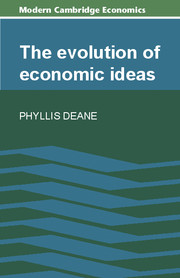Book contents
- Frontmatter
- Series preface
- Contents
- Introduction
- 1 Origins of modern economics
- 2 Adam Smith's theory of value
- 3 Origins of modern growth theory
- 4 Classical monetary theory
- 5 Ricardo on value, distribution and growth
- 6 Scope and methodology of classical political economy
- 7 The marginal revolution and the neo-classical triumph
- 8 The neo-classical theory of value
- 9 The Marxian alternative
- 10 Neo-classical orthodoxy in the inter-war period
- 11 Monetary theory in the neo-classical era
- 12 The Keynesian revolution
- 13 Twentieth-century growth theory
- 14 Methodological divisions in economics since Keynes
- Index of names
- Subject index
9 - The Marxian alternative
Published online by Cambridge University Press: 05 June 2012
- Frontmatter
- Series preface
- Contents
- Introduction
- 1 Origins of modern economics
- 2 Adam Smith's theory of value
- 3 Origins of modern growth theory
- 4 Classical monetary theory
- 5 Ricardo on value, distribution and growth
- 6 Scope and methodology of classical political economy
- 7 The marginal revolution and the neo-classical triumph
- 8 The neo-classical theory of value
- 9 The Marxian alternative
- 10 Neo-classical orthodoxy in the inter-war period
- 11 Monetary theory in the neo-classical era
- 12 The Keynesian revolution
- 13 Twentieth-century growth theory
- 14 Methodological divisions in economics since Keynes
- Index of names
- Subject index
Summary
In 1867 while Alfred Marshall the young mathematician was busy transcribing the basic theory of Mill and Ricardo into abstract mathematics there was published in Germany the first volume of Karl Marx's massive reconstruction of political economy – Das Kapital. Marx had been working his way through ‘the confounded ramifications of political economy’ in the British Museum Reading Room since 1850 and had already published (again in Germany) a substantial sample of his new theory, illustrating his distinctive methodological approach, in 1859 under the title: Zur Kritik der Politischen Oekonomie. Like both J. S. Mill and Marshall he was an innovative follower of Ricardo. Unlike Mill and Marshall he deliberately set out to replace the classical system of thought with a new integrated set of theories, concepts and analytical techniques – a new disciplinary matrix. However, he remained throughout his life outside (and virtually ignored by) the English-speaking community of economists and had little or no influence on the subsequent evolution of mainstream economic thought.
Yet Marxian economics descended directly from the English classical school. Marx shared the classical interest in growth and began, as Ricardo had done, by recognising value and income distribution as the key to understanding growth. He accepted Ricardo's labour-quantity theory of value and his theory of the falling rate of profit and snapped up his hints on technological unemployment.
- Type
- Chapter
- Information
- The Evolution of Economic Ideas , pp. 125 - 142Publisher: Cambridge University PressPrint publication year: 1978



